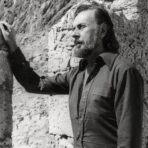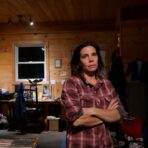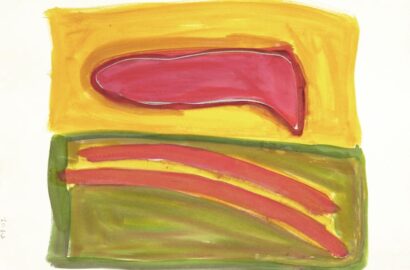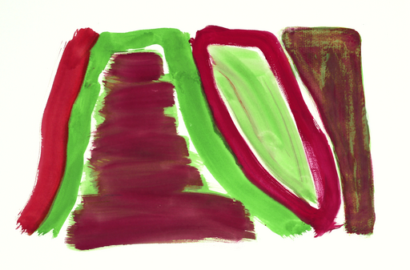Editor’s Note: For the next three weeks, we will be publishing a selection of poems from Yannis Ritsos’s Exercises, a new collection of translations by Spring Ulmer, published by Ugly Duckling Presse. We’re delighted to showcase work by this poet of conscience, who was a member of the Greek resistance during World War II and later spent several years in prison camps during more than one authoritarian dictatorship, including the military junta that controlled Greece from 1967 to 1974. We are pleased to publish the poems in Greek and English, and to celebrate the legacy of this essential voice, whose example remains meaningful and necessary—not only in regard to his own moment but also in regard to the world in which we find ourselves.
DAILY LIFE
He clenched his fist to hit someone, get revenge,
and with that clenched fist knocked on his friend’s door.
—Who is it? they asked from inside.
—Me, he said and stressed that it wasn’t anybody else;
it was he. He was. He unclenched his fist. Went inside.
There was a fire in the fireplace. They didn’t light the lamp.
Outside, everything, houses, roads, train tracks,
sank, sank, sank;
meanwhile the room got up in the middle of the night
secretive, stable, clean,
full of forgetfulness, ignorance, indifference—
it stood up as if blood from all the suffering
hearts in the world were being piped into it.
⸻
ΚΑΘΗΜΕΡΙΝΟΤΗΤΑ
Ἔσφιξε τὴ γροθιά του νὰ χτυπήσει κάποιον, νὰ ἐκδικηθεῖ,
κ’ ἔτσι μὲ τὴ γροθιὰ σφιγμένη χτύπησε τὴν πόρτα τοῦ φίλου του.
—Ποιός εἶναι; ρωτήσανε ἀπὸ μέσα.
—Ἐγώ· ἀποκρίθηκε καὶ τὄνιωσε πὼς εἶταν
αὐτὸς κι ὄχι ἄλλος· πὼς εἶταν. Ξέσφιξε μεμιᾶς τὴ γροθιά του. Μπῆκε μέσα.
Στὴν κάμαρα θἆχε φωτιά. Δὲν ἄναψαν τὴ λάμπα.
Ἔξω, τὰ πάντα, σπίτια, δρόμοι, τραῖνα,
ϐούλιαζαν, ϐούλιαζαν, ϐούλιαζαν,
ἐνῶ ἡ κάμαρα ὀρθωνόταν μὲς στὴ νύχτα
μυστική, σταθερή, ὑγιεινή,
γεμάτη λήθη, ἢ ἄγνοια, ἢ ἀδιαφορία. Ὀρθωνόταν
σὰ νὰ διοχετεύονταν σ’ αὐτὴν ὅλο τὸ αἷμα
ἀπ’ τὴν ταλαίπωρη καρδιὰ τοῦ κόσμου.
A CONVINCING LADDER
He started from the low country, where the morning sun doesn’t
pound,
and arrived, nearly on his own, on the mountain, almost at its peak.
However, he preserved in his eyes, in his mouth, in his face
the shadow of the ladder he had climbed,
you could even say his body was the ladder.
When others hesitated or doubted their height and their strength,
he showed them, one by one, the way with his own fingerprints
and footprints,
here and here and here, with patience and a smile at their denial,
so much so that he wasn’t a man
but just a ladder hanging in the sun.
Plants, birds, children, mothers climbed this ladder
and as evening fell, and the violets sparkled in the windows, and
were watered in their pots,
the old men went up without their walking sticks,
and the electrician rose bare-armed
to put a new bulb there above the milk-store,
and then our neighborhood was lit by a strong, sweet light.
⸻
ΠΕΙΣΤΙΚΗ ΣΚΑΛΑ
Ξεκίνησε ἀπ’ τὸν κάμπο χαμηλά, ἀπὸ κεῖ ποὺ τὸ πρωΐ δὲν τὸ χτυπάει ὁ
ἥλιος
κ’ ἔφτασε, μόνος του σχεδόν, ἐπάνω στὸ ϐουνό, σχεδὸν ὣς τὴν κορφή του.
Ὡστόσο διατήρησε στὰ μάτια του, στὸ στόμα του, στὸ πρόσωπό του
τὸν ἴσκιο αὐτῆς τῆς σκάλας ποὖχε ἀνέϐει,
μποροῦσες μάλιστα νὰ πεῖς πὼς τὸ ἴδιο του τὸ σῶμα εἶταν ἡ σκάλα.
Ὅταν οἱ ἄλλοι δίσταζαν ἢ ἀμφέϐαλλαν γιὰ τὸ ὕψος καὶ γιὰ τὶς δυνάμεις
τους,
αὐτὸς τοὺς ἔδειχνε ἕνα – ἕνα τὰ σκαλιὰ μὲ τὸ ἴδιο του τὸ δάχτυλο, σημάδια
καὶ πατήματα,
ἐδῶ κ’ ἐδῶ κ’ ἐδῶ, μὲ ὑπομονὴ καὶ μὲ χαμόγελο στὴν ἄρνησή τους,
τόσο ποὺ πιὰ δὲν εἶταν ἄνθρωπος
μὰ μοναχὰ μιὰ σκάλα κρεμασμένη μὲς στὸν ἥλιο.
Σ’ αὐτὴ τὴ σκάλα ἀνέϐαιναν φυτά, πουλιά, παιδιά, μητέρες,
κι ὡς ϐράδιαζε, κι ἀστράφταν ϐιολετιὰ τὰ τζάμια, καὶ ποτίζανε τὶς
γλάστρες,
ἀνέϐαιναν κ’ οἱ γέροι δίχως τὰ ραϐδιά τους,
ἀνέϐαινε ξεμπράτσωτος κι ὁ ἠλεκτρολόγος
νὰ ϐάλει ἕναν καινούργιο γλόμπο ἐκεῖ ψηλά, πάνω ἀπ’ τὸ γαλατάδικο
κ’ ἔφεγγε τότε ἡ συνοικία μας μ’ ἕνα γλυκύτατο καὶ ρωμαλέο φέγγος.
SUMMER NIGHT
The moon is a big illuminated glass door
high up on the twentieth floor of the night. Some folks are
celebrating up there;
easily discernable blues—old music in three-quarter time,
and now and then a dancing couple’s
doubled, spinning shadow erases the light from the balcony
door.
This was exactly when we happened to walk beneath the big trees
and somebody said completely unexpectedly, “Life is not poetry,
nor is poetry a skill or an ingenuity.”
And then we closed our eyes to better hear the silence.
But it was hot there; and we opened our eyes again.
All four windows of the moon were open above us. The dancers
had come out onto the balcony and were looking down. The
music had ended.
⸻
ΘΕΡΙΝΗ ΝΥΧΤΑ
Τὸ φεγγάρι εἶναι μιὰ μεγάλη φωτισμένη τζαμόπορτα
πάνω, ψηλά, στὸ εἰκοστὸ πάτωμα τῆς νύχτας. Κάποιοι γιορτάζουν ἐκεῖ
πάνω·
ἀκούγονται εὐδιάκριτα ἦχοι ἀπ’ τὸ γαλάζιο—μιὰ παλιὰ μουσικὴ σὲ τρία
τέταρτα,
καὶ πότε – πότε ἕνα ζευγάρι, χορεύοντας,
σϐήνει μὲ τὸ διπλὸ στροϐιλιζόμενο ἴσκιο του τὴ φωτισμένη μπαλ-
κονόπορτα.
Εἶταν τὴν ὥρα ἀκριϐῶς ποὺ πενούσαμε κάτω ἀπ’ τὰ μεγάλα δέντρα
καὶ κάποιος εἶπε ὁλότελα ἀπροσδόκητα: «Ἡ ζωὴ δὲν εἶναι ποίηση,
οὔτε κ’ ἡ ποίηση δεξιοτεχνία κ’ ἐφευρετικότητα».
Καὶ τότε κλείσαμε τὰ μάτια μας γιὰ ν’ ἀκουστεῖ ἡ σιωπὴ καλύτερα.
Μὰ ἐκεῖ μέσα εἶχε ζέστη· κι ανοίξαμε πάλι τὰ μάτια.
Έπάνω μας εἶχαν ἀνοίξει καὶ τὰ τέσσερα θυρόφυλλα τοῦ φεγγαριοῦ. Οἱ
χορευτὲς
εἶχαν ϐγεῖ στὸ μπαλκόνι καὶ κοίταζαν κάτω. Ἡ μουσικὴ εἶχε σωπάσει.
____
From Exercises 1950–1960 by Yannis Ritsos (Ugly Duckling Presse, 2025). Translation Copyright © Spring Ulmer, 2025.



